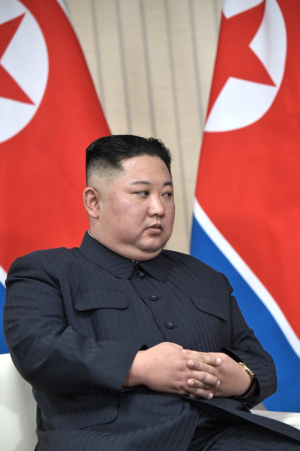North Korean leader Kim Jong Un is “rumored to be dead, brain dead, or just fine,” as the New York Post cheekily summarized while speculation swirled about the dictator’s possible illness or demise. Pyongyang on Monday published several messages from Kim dated to that day and, more credibly, South Korea announced its intelligence agencies have no reason to believe Kim is anything other than “alive and well.” Still, CNN continues to report tips from unnamed U.S. officials that Kim is in some sort of ill health, if not quite the life-threatening condition the network first reported a week ago.
Whatever Kim’s status, Washington’s handling of the situation is an indictment of U.S. policy toward North Korea. This incident should push the Trump administration toward a more realistic stance on the Kim regime and its nuclear arsenal. That means a shift away from focus on personalities and a new agenda of working-level talks marked by achievable aims, meaningful mutual concessions, and establishment of direct communications via liaison offices.
Trump has made a point of building personal rapport with Kim, boasting of their “love” for each other and orienting U.S.-North Korea relations around high-profile summits between the two. The tactic worked to de-escalate the “fire and fury”-era war or words in 2017, but that was the limit of its usefulness. Since the second summit in Vietnam, the relationship has deteriorated, and this month’s rumors of Kim’s death have cast that rising dysfunction in sharp relief. Rapport has its value, but it is no substitute for effective diplomacy and realistic strategy—strategy not dependent on a tinpot tyrant’s fleeting feelings about our president.
Trump’s interest in personal connection seems to be informed by the naïve idea that it can override Kim’s perception of his regime’s vital interests, specifically nuclear armament to deter U.S.-orchestrated regime change. It cannot. Kim won’t surrender his nuclear weapons while he believes his regime is at risk of U.S. attack, and given the United States’ recent history of regime change in the Middle East and North Africa, that belief is unlikely to shift in the near future. This reality is what makes the standard U.S. demand of complete, verifiable, and irreversible denuclearization (CVID) so absurd. By choosing that as the single goal of U.S.-North Korea talks, Washington ensures they fail. This is a self-destructive maximalism with no place in diplomacy.
A more productive approach would replace head-of-state summits with working-level negotiations in which U.S. representatives are authorized to both seek and give smaller concessions. For Washington, a timeline for progress toward an internationally-verified North Korean nuclear freeze would be a win. For Pyongyang, sanctions relief is obviously the big get, particularly as the COVID-19 pandemic is suspected to be spreading in North Korea.
Lifting sanctions could improve quality of life for ordinary North Koreans, who suffer under the scarcity caused by international sanctions regimes though they have no control over their government’s malfeasance, without endangering the United States or our allies. Especially for a dictator so focused on regime survival, the threat of overwhelming U.S. retaliation will serve as indefinite deterrence against an unprovoked North Korean attack.
Whether as a precursor or early result of such talks, the Trump administration should establish a liaison office in Pyongyang and allow North Korea to do the same in Washington. This administration has considered the idea, as have other American administrations since the early 1990s, because it could be a useful symbolic accomplishment. But it’s not all symbolism: With a liaison from Washington in Pyongyang and vice versa, perhaps communications that now happen on Twitter and in North Korean state media could be taken private and toned down to avoid needless antagonism. Likewise, perhaps the sort of public and potentially harmful speculation this past week’s rumors have occasioned could be averted.
As it is, however, the rumors of Kim’s death or illness arrived without any of the safeguards a more viable diplomatic relationship could provide. For now, Washington’s immediate task is to avoid adding to the chaos. (U.S. allies like South Korea and Japan will agree, as will rivals like Russia and China which share a border with North Korea.)
While anyone of good conscience wants to see the end of the Kim regime’s unconscionable oppression, a sudden transition shaped by fears of U.S. military intervention could too easily descend into horrific violence—and remember, the highest goal of U.S. policy toward North Korea is not denuclearization but peace. Dismantling Pyongyang’s nuclear arsenal may one day be part of that project. But for now, patient diplomacy and direct communication are our most urgent needs.
Bonnie Kristian is a fellow at Defense Priorities, contributing editor at The Week, and columnist at Christianity Today. Her writing has also appeared at CNN, Politico, USA Today, the Los Angeles Times, Defense One, and The American Conservative, among other outlets.

































